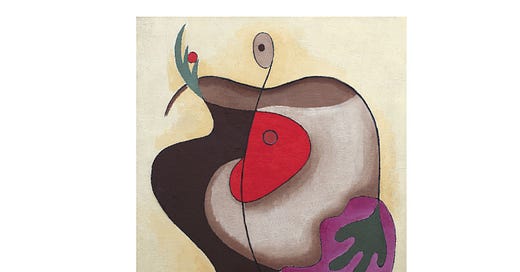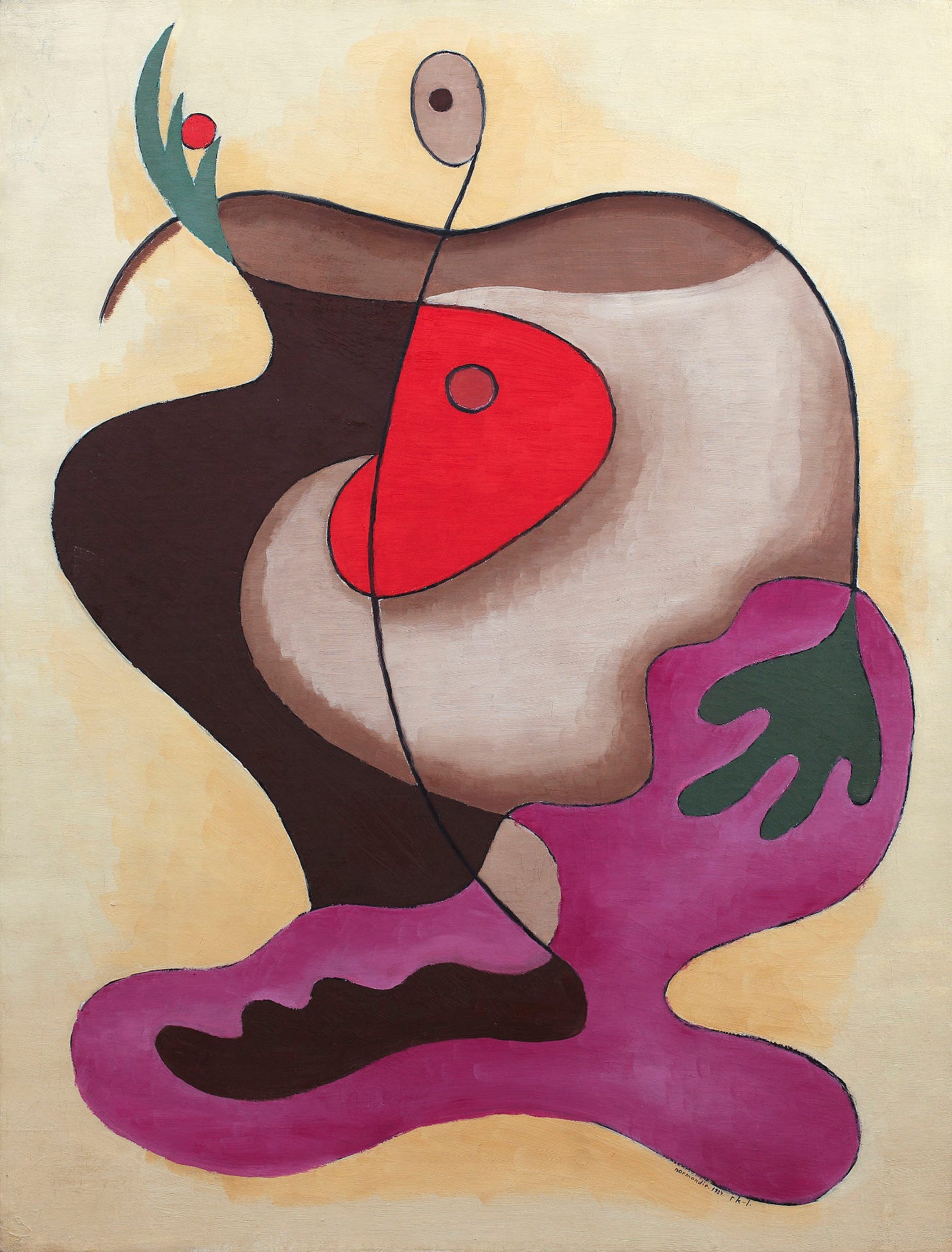I recently discovered the Danish artist Rita Kernn-Larsen (1904-1998), whose work encompasses both abstraction and surrealism in a way that speaks to me. I have never been a great fan of abstract art, but maybe this will be my way in (and perhaps yours too?).
Apple, from 1934, is one of Kernn-Larsen’s most playful pictures and right now I need cheering up because since the start of the year I’ve been struggling with painful tendonitis in the arm I write with. I have been forced to rest but without handwriting I can’t create or even properly order my thoughts. Typing isn’t much easier.
Anyway, I hope you’ll be consoled and entertained, as I was while writing it, by the fantastical appearance of Rita Kernn-Larsen’s Apple in an unlikely place.
By the way, the point of The Fur Cup is to encourage people to take ownership of surrealist art and have fun, so do let me know what you make of the picture and/or my flight of fantasy about it by clicking the ‘leave a comment’ button.
You can also click the heart to ‘like’ it, which will mean that more folk on Substack get to see my posts and that I feel it’s worthwhile to go on writing them.
Thanks!
As I was chairing a meeting in the boardroom, an apple walked in.
I knew it was an apple from its roundness and the dimple in the top. It was not green or red, if anything it was predominantly purple with some brown, and stood at just a few inches tall. It paused, surveying the scene in the room, though I couldn’t have said what parts of it were eyes. A grey cartoonish hand, however, rested on a haunch away from the centre of gravity of the body, making it look like a very fat human. If this was a person, it would be obese and you might shake your head thinking of fast-food adverts, but it had a delight in its bigness, a pride almost. The way it — he, I think —waddled from foot to foot in a rolling, smiling sort of way, conveyed not just fatness but jollity, merrymaking, juiciness. Happiness.
In this room full of business suits clamouring for hierarchy, he tottered and wove, showing how their postures of superiority were ugly and unnatural. A child among serious adults, he climbed, with great concentration, up onto a chair and from there to the long table, then casually made his way towards me at the head.
He brought fairy stories with him: rosy-cheeked princesses-to-be, and the humble artisans of folklore. He brought an old grandfather with his warm, walled garden and a kindly grandmother with her gleaming fruit bowl. Although he was most definitely already plucked, he brought Eden before the snake. He came with the innocence before the Fall.
Ironically, he had walked into a meeting about a petrochemical company dealing in crop sprays. Perhaps that is what had conjured him up. As he threw his pithy weight from foot to shapeless foot I looked anxiously at the other faces around the table. They were all apparently oblivious of this vision before me and, stricken with panic and embarrassment, I felt a laugh gurgle up from the pit of my stomach.
Suddenly, the things we had been discussing: air-miles, the competitors' approach to labelling and the supermarket supply chain, all seemed ridiculous and alien. Here was the solidity of nature's food, a globe of crisp edible flesh you could hold in your hand which had exactly the right weight and density. Humans have bred the apple, with care and handheld knives, and here it still is: a source of happiness, reassurance and nutrition. Eden, indeed.
As my thoughts left profit margins and spreadsheets far behind, I wandered through the Bible in search of fruits and reached The Song of Solomon.
'Comfort me with apples,' I said, out loud, and the whole board looked at me as if I had gone completely mad.






I enjoyed this! I’m shortly to retire, thankfully not from a global petrochemical corporation, but still, leaving a sector run by meetings and boards. I know that sense of alienation well, and am now daydreaming of running barefoot into a beautiful orchard.